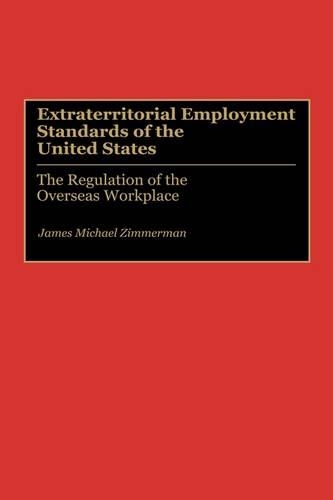
Extraterritorial Employment Standards of the United States: The Regulation of the Overseas Workplace
(Hardback)
Publishing Details
Extraterritorial Employment Standards of the United States: The Regulation of the Overseas Workplace
By (Author) James M. Zimmerman
Bloomsbury Publishing PLC
Praeger Publishers Inc
23rd March 1992
United States
Classifications
Tertiary Education
Non Fiction
Employment and labour law: general
Citizenship and nationality law
International law
Sociology: work and labour
347.30412
Physical Properties
Hardback
216
Description
This book examines US efforts to regulate the foreign workplace. It addresses extraterritorial employment standards, or legislation that transcends US territorial boundaries. The United States imposes extraterritorial standards by private rights of action or by trade and investment incentives. Some standards apply only to nationals working overseas, while others apply only to workforce in general. This book reviews the development of international fair labour standards, the relationship between the United States and the various international organisations involved with workplace conditions, and the unilateral efforts of the United States to regulate foreign labour conditions. This book offers analysis of extraterritorial employment standards. Part 1 addresses the US role in the enforcement of internationally recognised worker rights in the world community. Worker rights include the right of association; the right to organize and bargain collectively; a prohibition on the use of any form of forced or compulsory labour; a minimum age for the employment of children; acceptable conditions of work with respect of minimum wages, hours of work, and occupational safety and health; and the right to work in an environment free from discrimination. By using economic coercion in the form of preferential trade benefits, investment incentives and trade sanctions, the United States attempts to encourage foreign governments and employers, both local and transnational, to abandon exploitative working conditions for employment standards recognised by the world community. Part 1 analyses the worker rights requirements for the Generalised Systems of Preferences (GSP), the Caribbean Basin Initiative (CBI), Overseas Private Investment Corporation (OPIC), Multilateral Investment Guarantee Agency (MIGA), the Export-Import Bank (Eximbank) of the United States, and the Anti-Apartheid Act of 1986. Part 1 also reviews various federal statutes that authorise the use of economic sanctions against foreign governments and employers that maintain exploitative and abusive employment practices in the foreign workplace, including the Omnibus Trade and Competitiveness Act of 1988, the International Emergency Economic Powers Act, and the Smoot-Hawley Tariff Act of 1930. Part 2 is an exhaustive review of employment standards for US citizens employed abroad. It addresses extraterritorial wage and hour regulation - the Seaman's Act, Fair Labour Standards Act (FLSA) and the Equal Pay Act (EPA); equal employment statutes that are applied overseas, including the Age Discrimination in Employment Act (ADEA), Title VII of the Civil Rights Act of 1964 (Title VII), the Export Administration Act of 1979 (EAA), and Section 106 of Public Law 92-129, protecting civilians employed at overseas defense facilities; and federal statutes establishing worker compensation standards to persons employed at military installations or in areas where the risk of war hazards are prevalent. Part 3 is a discussion of the policy concerns and implications of extraterritorial employment standards. These standards impact domestic producers, domestic workers and their representative organisations, consumers, exporters and importers, as well as multinational enterprises and their employees. This book may be useful for manager, legal counsel for employers and employees, policy makers and labor leaders in any industry having contact with the global economy.
Author Bio
JAMES MICHAEL ZIMMERMAN is an attorney in private practice in San Diego, California with the firm Sparber, Ferguson, Naumann, Ponder & Ryan. He writes frequently on international law topics, including international trade and labor issues, publishing articles in such journals as China Business Review, International Labor Review, Cornell International Law Journal, Suffolk Transnational Law Journal, and Hastings International and Comparative Law Review.
